Похожие презентации:
Английский для начинающих
1. Английский для начинающих
English for BeginnersСоставитель:
ст. преподаватель
Щеняева Т.Д.
2. Английский алфавит
AaFf
Kk
Pp
Uu
Zz
Bb
Gg
Ll
Vv
Cc Dd
Hh
Ii
Mm Nn
Rr Ss
Ww Xx
Ee
Jj
Oo
Tt
Yy
3. Согласные буквы и звуки
BbCc
Dd
Ff
Gg
Hh
Jj
Kk
Ll
Mm Nn
Pp
Rr
Ss
Tt
Vv
Ww Xx
Zz
4. Гласные буквы и звуки
Aadate fame make take
bad bat map plan
a
an
Ee
be he
bed pen
she
set
Pete
web
5.
Iipie
bid
tie
kid
bike file
did it
Oo
no
on
pole sole vote
not spot bottom
6.
Uuduke fume tune student
up
but cup bubble
put
Yy
by my
system
yes yoke
baby city lady
7. Буквосочетания согласных
ckch
ch
tch
dg(e)
ng
gn
-mb
-bt
kn
ph
qu
que
-lf
-lm
sh
-ssure
-ssia
-ssian
sc
th
-tion
-tial
-ssion
-ss
-sion
wh
wr
8. Буквосочетания гласных
aichain main pain
ie
field chief niece
ay
au
day play stay
fault sauce author
oo
oa
book look moon
boat coat
ea
teach easy cheap
bread head heavy
oi
oy
o
ee
cheese street
ou
ey
key
grey
euro Europe
noisy point coin
boy toy enjoy
some son love
other
group you
country couple
about house
four your
eu
9. Буквосочетания гласных с согласными
-air-ar
-aw
wawar-ear
-ear
-er-
chair, fair, pair, prairie
dark, farm, park, star
dawn, chaw, claw, paw
want, was, wash, watch
war, ward, warden, warm
clear, dear, gear, fear, near, beard
bear
berg, dermis, perk, term
10.
-er-ere
-ere
-eer
-ier
-igh-ew
-iew
her
here, mere, sphere
there, where
deer, sheer
heir, their
flight, light, night
dew, new, few
view
11.
-ir-or
-or-oor
-ore-our
-ow
-ur
-yr
-yre
fir,
first, girl
actor, doctor, distributor
form, port, sport
door, floor
more, shore
our, hour, flour
now, down, town
но: window
curb, turn
myrtle
tyre
12. Структура предложения
Простое повествовательноепредложение
Подлежащее
сказуемое
дополнение
13. Способы выражения подлежащего
1)Имя существительное – собственное
или нарицательное:
Jane, Nick, Harrison Ford, Belarus, Great
Britain, Minsk, London, name, family,
student, university, country, capital,
economy, industry
14. МНОЖЕСТВЕННОЕ ЧИСЛО ИМЕН СУЩЕСТВИТЕЛЬНЫХ
Ед. числоМн.число
a)
one bird
one street
one rose
two birds
two streets
two roses
к основе существительного
прибавляется окончание -s
b)
one dish
one match
one class
one box
two dishes
two matches
two classes
two boxes
-sh; -ch; -ss; -s прибавляется
окончание -es
c)
one baby
one city
one day
one key
two babies
two cities
two days
two keys
Если существительное оканчивается
на –y с предшествующей
согласной, то y i + -es
Если предшествовала гласная
15. Множественное число имен существительных
Множественное число имен существительных(исчисляемых) образуется с помощью
окончания – s(es):
а) cat – cats /s/ student – students /s/
game – games /z/ dog – dogs /z/
file – files/z/
day – days /z/
bus – buses /iz/ box – boxes /iz/
house – houses /iz/ bench – benches /iz/
glass – glasses /iz/
16.
б) city – citieslady – ladies
army – armies
economy – economies
в) life – lives
wife – wives
half – halves
shelf- shelves
17. Исключения
d) one knifone shelf
two knives
two shelves
e) one child
one man
one woman
one tooth
one foot
one goose
two children
two men
two women
two teeth
two feet
two geese
Если существительное
оканчивается на
–fe, -f, то-f -v + es
18. Имена существительные неисчисляемые во множественном числе не употребляются:
knowledgebusiness
progress
money
Information
equipment
machinery
traffic
19. Притяжательный падеж имени существительного
Форму притяжательного падежаимеют обычно одушевленные
имена существительные,
обозначающие живое существо,
которому принадлежит какойнибудь предмет, качество или
признак.
20.
Существительное вединственном числе
образует
притяжательный
падеж при помощи
–’s,
а во множественном
числе только
апострофа.
Jane’s sister
Dan Brown’s novel
student’s notebook
child’s toy
cat’s tail
boys’ voices
girls’ names
eagles’ nests
21. Притяжательный падеж Существительные
Ед ч.the student
my baby
a man
Мн ч.
the students
my babies
men
children
the student’s name
my baby’s name
a man’s name
the students’ names
my babies’ names
men’s names
children’s names
22.
Принадлежностьлицу, выраженному
именем
существительным,
какого-нибудь
предмета, качества
или признака можно
также выразить,
поставив перед ним
предлог of.
the voice of the girl
the hands of
the mother
the house of the farmer
the clothes of
the children
the problems of
the economists
23.
Ответьте на вопросы, употребивсуществительные, данные в скобках, в
притяжательном падеже:
1.
Whose watch is it? (my brother).
2.
Whose children are these? (my friend).
3.
Whose books are those? (my children).
4.
Whose bag is that? (this woman).
5.
Whose husband is he? (my sister).
6.
Whose teacher was she? (my son).
7.
Whose son was born in Kiev? (my friend)
8.
Whose parents have a house in the country? (Mr
Sokolov).
24. Способы передачи падежных форм
Значения большинства русских падежныхформ передаются в английском языке
формой общего падежа с предлогом или без
предлога.
Им. п.
студент
the student
Род.п.
студента
(of) the student
Дат.п.
студенту
(to) the student
Вин.п.
студента
the student
Тв.п.
студентом
(by) the student
Пр.п.
(о) студенте
(about) the student
25. Артикль
В английском языке перед именемсуществительным обычно стоит
артикль.
Различают неопределенный артикль
a(an) и определенный артикль the.
26.
Неопределенный артикльa(an) употребляется
перед исчисляемыми
существительным
в единственном числе.
Неопределенный артикль
имеет форму a перед
существительными,
начинающимися
с согласной, и форму an
перед
существительными,
начинающимися
с гласной.
a country
a businessman
a manager
a firm
a company
an economy
an economist
an accountant
an industry
an employee
27.
Определенныйартикль the может
употребляться
перед любым
нарицательным
существительным
как в единственном,
так и во
множественном
числе.
the money
the information
the economy
the economists
the industries
28.
Употребляя неопределенный артикль,мы называем предмет (вещь, живое
существо) и представляем его как один
из класса ему подобных.
29.
Определенный артикль (the) употребляетсяперед существительным, обозначающим
предмет
а) уже известный слушающему (читающему)
из предыдущей информации;
б) единственный в данной ситуации;
в) единственный вообще во всех ситуациях.
30.
1. This is a resource. The resource isimportant.
2. This is a city. The city is old but very nice.
3. They are at the bank now.
4. There are no stars in the sky tonight.
5. This is the only book on this problem.
31. Местоимение (Pronoun)
Личные местоименияОбщий падеж
Косвенный падеж
I–я
me – меня, мне
You – ты
you – тебя, тебе
He – он
him – его, ему
She – она
her – её, ей
It – он, она; это
it – его, ему; её, ей; это
We – мы
us – нас, нам
You – вы
you – вас, вам
They – они
them – их, им
32. Глагол to be «быть»
Спряжение глагола to be в настоящемвремени
to be a student – быть студентом
to be … years old – о возрасте
to be from – быть родом из
to be married – быть женатым, замужем
to be unmarried – быть неженатым,
незамужем
33. ГЛАГОЛ to be «БЫТЬ» Утвердительная форма
Лицо1-е
2-е
3-е
Число
единственное
множественное
I am
you are
he
she
it
we are
you are
they are
is
34.
I am a student.You are a student.
She is a student.
He is a student.
It is a student.
We are students.
You are students.
They are students.
I’m a student.
You’re a student.
She’s a student.
He’s a student.
It’s a student.
We’re students.
You’re students.
They’re students.
35.
Поставьте существительныево множественное число:
1.
2.
3.
4.
5.
6.
7.
8.
This is a good student.
The director is in the office.
Is that your computer?
Was that computer on sale?
This programmer is very busy.
This institute is in Laso Street.
That businessman is very important.
Is his business plan on the director’s table?
36.
Отрицательная форма глагола to beI am not a doctor.
You are not a doctor.
She is not a doctor.
He is not a doctor.
It is not a doctor.
We are not doctors.
You are not doctors.
They are not doctors.
I’m not a doctor.
You aren’t a doctor.
She isn’t a doctor.
He isn’t a doctor.
It isn’t a doctor.
We aren’t doctors.
You aren’t doctors.
They aren’t doctors.
37.
Вопросительная форма глагола to beОбщий вопрос
Am I a student?
Are you a student?
Is she a student?
Is he a student?
Is it a student?
Are we students?
Are you students?
Are they students
Yes, I am. No, I am not.
Yes, she is. No, she isn’t.
Yes, we are. No, we aren’t.
38.
Поставьте предложения ввопросительную и
отрицательную форму:
1.
2.
3.
4.
5.
6.
His girlfriend is in the theatre.
Those books are new.
They are good engineers.
He is my brother.
His name is Ivanov.
This sofa is comfortable.
39. Специальный вопрос
Специальные словаWhat – что, какой
Which – который
Where – где, куда
When – когда
Who - кто
How – как
How old – сколько лет
How many – сколько
How much - сколько
What is your name?
My name is Victor.
How old are you?
I’m 18 years old.
What is he?
He’s an economist.
Where are you from?
I’m from Belarus.
When is his birthday?
It is on Friday.
40. Вводный оборот there is/ there are
Для выражения наличия или существованияв определенном месте или отрезке
времени лица или предмета
употребляется вводный оборот there is /
there are со значением имеется,
находится, есть, существует.
41.
Оборот there is/ there are стоит в началепредложения; за ним стоит подлежащее,
за которым следует обстоятельство места
или времени.
В русском языке соответствующие
предложения начинаются с
обстоятельства места или времени.
42.
There is a telephone in this room.В этой комнате есть (имеется) телефон.
There are many apple trees in the garden.
В саду есть много яблонь.
There are many children there.
Там много детей.
43.
Оборот there is/ there areв отрицательном
предложении
There isn’t a teacher in
the classroom.
There aren’t any
computers here.
Оборот there is/ there are
в вопросительном
предложении
Is there a teacher in the
classroom?
Yes, there is.
No, there isn’t.
Are there any computers
here?
Yes, there are.
No, there aren’t.
44.
I.Переведите следующие предложения с
оборотом there is/ there are.
1.
There is a disco near the university.
There are many tourists in the city.
There isn’t a library near the university.
There aren’t many hospitals in the town.
Is there a television in the room?
How many boys and girls are there in the family?
2.
3.
4.
5.
6.
45.
II. Вставьте there is или there are.( train - поезд )
2.
(snow – снег
ground – земля)
3. … no time to see my friend.
(time – время
to see – видеть)
4. … many children in the swimming pool?
(swimming pool – бассейн)
5. … no mistakes in your test.
(mistake – ошибка)
6. … a garden near your house?
(garden – сад
near – около, возле)
1.
… many trains to Moscow.
… much snow on the ground.
46. Глагол to have «иметь»
Спряжение глагола to have в настоящемвремени
I have
Я имею/ У меня есть
You have
Ты имеешь/ У тебя есть
He has
Он имеет/ У него есть
She has
Она имеет/ У неё есть
It has
Он/ Она имеет
We have
Мы имеем/ У нас есть
You have
Вы имеете/ У вас есть
They have
Они имеют/ У них есть
47.
Отрицательная формаглагола to have
образуется при
помощи частицы not.
В вопросительной
форме глагол to have
ставится перед
подлежащим.
I have not (haven’t) a
watch.
He has not (hasn’t) any
book on this subject.
We have no time to go
there.
Have you a good car?
Yes, I have.
No, I haven’t.
Has she a big family?
Yes, she has.
No, she hasn’t.
48. Устойчивые выражения с глаголом to have
To have breakfast – завтракатьTo have dinner – обедать
To have supper – ужинать
To have a rest – отдыхать
To have a talk – говорить
To have a good time – хорошо проводить
время
49.
I.Переведите следующие предложения.
1.
I haven’t her address. (her – её)
He has very interesting books on economics.
(very – очень; on – по)
Usually at weekends we have a good time.
(usually – обычно; at – на, по)
Ann never has supper. (never – никогда)
Have you many relatives in Minsk?
(relatives – родственники)
2.
3.
4.
5.
50. Местоимения
Именительныйпадеж
Притяжательный
падеж
Объектный падеж
I
You
He
She
It
We
They
My
Your
His
Her
Its
Our
Their
Me
You
Him
Her
It
Us
Them
51. Притяжательные местоимения
Зависимая формаMy – мой, -я, -ё, -и
Your – твой; -я, -ё, -и
His - его
Her - её
Its - его, её
Our – наш, -а, -е, -и
Your – ваш, -а, -и
Their - их
Независимая форма
mine
yours
his
hers
its
ours
yours
theirs
52.
Употребите притяжательныеместоимения вместо
существительных в
притяжательном падеже:
1.Take Mike’s book off the table!
2.Give me Kate’s pen.
3.What’s the girl’s name?
4.How old is Mr. Black’s son?
5.Where are your friends’ children now?
6.This is my friend’s daughter.
7.These are Mr. Loveson’s telexes.
53. Указательные местоимения
Ед.ч.This – этот, эта, это
That – тот, та, то
Мн.ч.
These – эти
Those – те
Such – такой, такая, такие
54. Неопределенные и отрицательные местоимения
Some – какой-то, какой-нибудь, какой-либоSomebody, someone - кто-то, кто-нибудь
Something - что-нибудь
(употребляются в утвердительных
предложениях)
55.
Any – какой-то, какой-нибудьAnybody, anyone – кто-либо, кто-нибудь
Anything - что-либо, что-нибудь
(употребляются в вопросительных и
отрицательных предложениях)
Any – любой (в утвердительных
предложениях)
56.
No – никакой, никакая, никакиеNobody, no one – никто
Nothing – ничто
(употребляются в отрицательных
предложениях)
57.
Утвердительные Отрицательные Вопросительныепредложения
предложения
предложения
Give me some
We don’t have
Are there any
books on finance. any magazines
companies there?
here.
We need some
information about
the prices for a
model.
There isn’t any
time to do this
work.
Do you have any
money?
58.
1.2.
3.
4.
5.
6.
He has some friends in Great Britain.
There are some students in the classroom.
Somebody is at the door.
There isn’t anything in the box.
Some students are absent today.
There is some progress in the national
economy this year.
59. Возвратные местоимения
Возвратные местоимения образуютсяпутем прибавления к притяжательным
местоимениям my, our, your,
личным местоимениям him, her, it, them,
и неопределенному местоимению one
окончания self (к местоимениям ед.ч.)
и selves (к местоимениям мн.ч.)
60.
Единственное числоМножественное число
I - myself
We - ourselves
You - yourself
You - yourselves
He - himself
She - herself
It - itself
One - oneself
They - themselves
61.
Возвратные местоимения употребляются вфункции дополнения после ряда глаголов. Они
соответствуют в русском языке:
1.
Частице –ся(-сь):
She cut herself. – Она порезалась.
He defended himself bravely. – Он храбро
защищался.
Go and wash yourself, Mary. – Пойди и умойся,
Мария.
62.
2. Возвратному местоимению себя (себе,собой):
He bought himself a new coat. – Он купил
себе новое пальто.
She spoke very little of herself. – Она очень
мало говорила о себе.
I am not pleased with myself. – Я недоволен
собой.
63.
3. Возвратному местоимению сам (сама,само, сами) для усиления значения
существительного или местоимения.
В этом случае они могут стоять как в
конце предложения, так и после слова,
которое они усиливают.
64.
I saw it myself.I myself saw it. - Я сам это видел.
He did it himself.
He himself did it. – Он сам это сделал.
They said so themselves.
They themselves said so. – Они сами это сказали.
65. Повелительное наклонение
Повелительное наклонение выражаетпобуждение к действию, т.е. приказание,
просьбу, совет и т.д.
Повелительное наклонение образуется
глаголом без частицы to.
66.
Утвердительная форма повелительногонаклонения совпадает с формой
инфинитива без частицы to.
to read читать Read! Читайте! Читай!
to go
идти
Go!
Идите! Иди!
to help помогать Help me, please!
to give давать
Please give him the book.
67.
Отрицательная форма повелительногонаклонения образуется при помощи
вспомогательного глагола do
и отрицательной частицы not (don’t).
Don’t go!
Не уходите.
Don’t open the window.
Don’t ask about it.
68.
Для выражения побуждения к действию,обращенного к первому (I, we) и третьему
лицу (he, she), употребляется глагол let,
соответствующее личное местоимение в
косвенном падеже и инфинитив без
частицы to.
Let me do it.
Дайте мне сделать это.
69.
Let us (let’s) go home.Давайте пойдем домой.
Let him answer the question.
Пусть он ответит на вопрос.
Let them go there.
Пусть они пойдут туда.
Let Ann make coffee.
Пусть Анна приготовит кофе.
70. Настоящее простое время (Present Simple)
Present Simple употребляетсядля выражения
1) повторяющегося действия или признака;
2) постоянного действия;
3) общеизвестного факта.
71. Наречия и словосочетания в простом настоящем времени (Present Simple)
Для указания на повторяющееся действие илипризнак употребляются следующие наречия
и словосочетания:
always - всегда; often - часто;
usually - обычно;
seldom - редко; never - никогда
every day - каждый день;
every week - каждую неделю;
every year - каждый год
72. Образование простого настоящего времени ( Present Simple)
Утвердительные предложенияI
You
work
work
We
They
work
work
He
She
It
works
works
works
at the plant.
73.
Отрицательные предложенияI
do not (don’t) work
You do not (don’t) work
We
do not (don’t) work
They do not (don’t) work
He
She
does not (doesn’t) work
does not (doesn’t) work
It
does not (doesn’t) work
at the plant.
74. Вопросительные предложения
Общий вопросDo
I
work at the plant?
Do
you
work at the plant?
Do
we
work at the plant?
Do
they
work at the plant?
Does
he
work at the plant?
Does
she
work at the plant?
Does
it
work at the plant?
75.
Краткие ответы на общие вопросы:Do you speak English? - Yes, I do.
Do you live in London? – No, I don’t.
Does Peter work ? - No, he doesn’t.
Does he study? – Yes, he does.
76. Специальный вопрос
Специальные слова:What – что? какой?
Which – который?
When – когда?
Where – где? куда?
Why – почему? зачем?
How – как?
Who – кто?
Whose – чей?
Where
do
you
What
does he
study?
When
do
What
goods
does the
plant
leave
home?
produce?
How
does it
work?
Why
do
grow
flowers?
they
they
live?
77. Прошедшее простое время (Past Simple)
Образование Past SimplePast Simple правильных глаголов
образуется путем прибавления во всех
лицах окончания – ed к форме глагола:
to live – lived /d/; to study - studied /d/;
to work – worked /t/; to ask - asked /t/;
to translate – translated /id/;
to divide – divided /id/
78.
Past Simple неправильных глаголовобразуется различными другими
способами, которые представлены в
Таблице неправильных глаголов:
Первая форма
(инфинитив)
be
begin
make
Вторая форма
(Past Simple)
was/ were
began
made
Третья форма
(причастие II)
been
begun
made
79. Отрицательная и вопросительная формы правильных и неправильных глаголов в Past Simple
Утвердительнаяформа
Отрицательная Вопросительная
форма
форма
I worked
He (she, it)
worked
I did not work
He (she, it) did
not work
We made
You made
They made
We did not make Did we make?
You did not make Did you make?
They did not
Did they make?
make
did not = didn’t
Did I work?
Did he (she, it)
work?
80.
to analyze – анализироватьThe economists analyzed important data last year.
to study – изучать
My parents didn’t study economics at the University.
to fall – падать, снижаться
Did the living standards of the population fall last year?
81. Глагол to be в простом прошедшем времени (Past Simple)
was – был, была, былоwere – были
1.
2.
I (he, she, it) was at the university
yesterday.
We (you, they) were at the university
yesterday.
82. Отрицательные и вопросительные предложения с глаголом to be в Past Simple
I was not (wasn’t)Was I …?
He was not (wasn’t)
Was he …?
She was not (wasn’t)
Was she … ?
It was not (wasn’t)
Was it …?
We were not (weren’t)
Were we … ?
You were not (weren’t)
Were you … ?
They were not (weren’t)
Were they … ?
83.
1.2.
3.
4.
She wasn’t at work last week. Her children
were ill.
The economist’s prediction was correct.
The prices for the services weren’t high at
that time.
There weren’t many plants in the area.
84. Наречия прошедшего времени (Past Simple)
yesterday – вчераthe day before yesterday – позавчера
ago – назад
the other day – на днях
last week – на прошлой неделе
last month – в прошлом месяце
last year – в прошлом году
then – тогда
when - когда
85.
1.2.
3.
4.
5.
When she was young, she danced a lot.
Last year I often went to the theatre.
I spoke to him the other day.
The goods arrived the day before
yesterday.
He came at 5 o’clock.
86. Употребление простого прошедшего времени (Past Simple)
1.2.
3.
4.
5.
Для выражения действия, совершившегося (что
сделал?) или совершавшегося (что делал?)
в прошлом.
В повествовании для изложения событий,
имевших место в прошлом.
В разговоре о прошедших событиях.
Для выражения последовательных действий
в прошлом.
Для выражения обычного, повторяющегося
прошедшего действия.
87. Будущее простое время (Future Simple)
Образование будущего простого времени(Future Simple)
Утвердительная форма
Отрицательная форма
Вопросительная
форма
I will (shall) work
(I’ll work)
I will not (shall not)
work (won’t/ shan’t)
Will (shall) I work
…?
We will (shall) work
(We’ll work)
We will not (shall not)
work (won’t/ shan’t)
Will (shall) we
work…?
He will work (He’ll work)
He will not work (won’t)
Will he work…?
She will work (She’ll work)
It will work (It’ll work)
They will work (They’ll work)
88. Употребление простого будущего времени (Future Simple)
Future Simple употребляется длявыражения действия, которое совершится
или будет совершаться в будущем.
Future Simple переводится на русский язык
глаголом совершенного или
несовершенного вида в зависимости от
общего смысла предложения.
89. Наречия будущего времени
tomorrow – завтраthe day after tomorrow – послезавтра
tonight – сегодня вечером
soon – скоро
next week – на следующей неделе
next month – в следующем месяце
next year – в следующем году
in two/ three days – через два/ три дня
90.
1.2.
3.
4.
5.
6.
7.
I’ll do it.
She’ll call you tomorrow.
I’m sure they’ll support your idea.
My elder son will be seven in June.
They’ll call you back in fifteen minutes.
I won’t forget it.
There won’t be many people there.
91.
8. They won’t offer us any help.9. The British businessmen will meet in Minsk
next month.
10. Will you be at home tonight?
11. When will she be back?
12. What will you do after the graduation from
the university
92. Степени сравнения прилагательных
Положительная Сравнительнаястепень
степень
Превосходная
степень
short
shorter
the shortest
nice
nicer
the nicest
big
bigger
the biggest
easy
easier
the easiest
early
earlier
the earliest
simple
simpler
the simplest
93.
Положительная Сравнительнаястепень
степень
Превосходная
степень
beautiful
more beautiful
the most
beautiful
the most
expensive
expensive
more expensive
useful
more useful
the most useful
modern
more modern
the most modern
tired
more tired
the most tired
94.
Положительная Сравнительнаястепень
степень
Превосходная
степень
good
better
The best
bad
worse
The worst
little
less
The least
old
older/ elder
the oldest/ the
eldest
many
more
the most
95.
1.Образуйте сравнительную и
превосходную степени сравнения
прилагательных.
Few, high, low, fast, easy, cheap, necessary,
proper, big, important, essential, old,
expensive, small, happy.
96.
2. Переведите на русский язык.1. Let’s discuss more important problems
today.
2. It’s the most useful book on the subject.
3. Saturday is the best day of the week, and
Monday is the worst!
4. He is one of my oldest friends.
97.
5. I’m the eldest in the family.6. This room is bigger, and that one is smaller.
7. London is older than (чем) Sheffield.
8. Russian grammar is more difficult than
English grammar.
9. He’s five years older than his wife.
10. I’m more careful driver than him.
98. Числительные
12
3
4
5
6
7
8
9
10
11
12
13
14
15
One
Two
Three
Four
Fife
Six
Seven
Eight
Nine
Ten
Eleven
Twelve
Thirteen
Fourteen
Fifteen
20
21
26
30
40
50
60
70
80
90
100
1 000
1 000 000
Twenty
Twenty-one
Twenty-six
Thirty
Forty
Fifty
Sixty
Seventy
Eighty
Ninety
A hundred
A thousand
A million
99.
Прочитайте следующиечислительные:
.
1, 7, 18, 11, 13, 15, 48,105, 98, 143, 21 321, 65, 3, 7 543, 321
543, 6 321 607, 794 432 904
даты: 12 апреля 1645 года; 1 января 2005 года; 9 сентября
1985 года; 11 мая 1376 года




















































































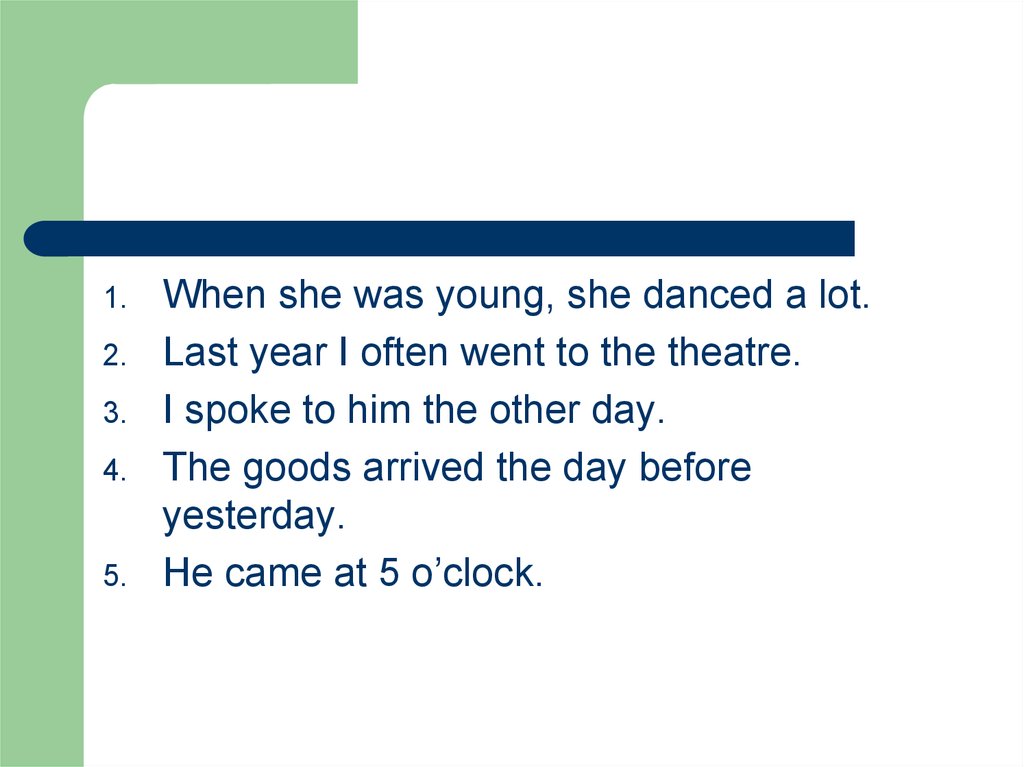

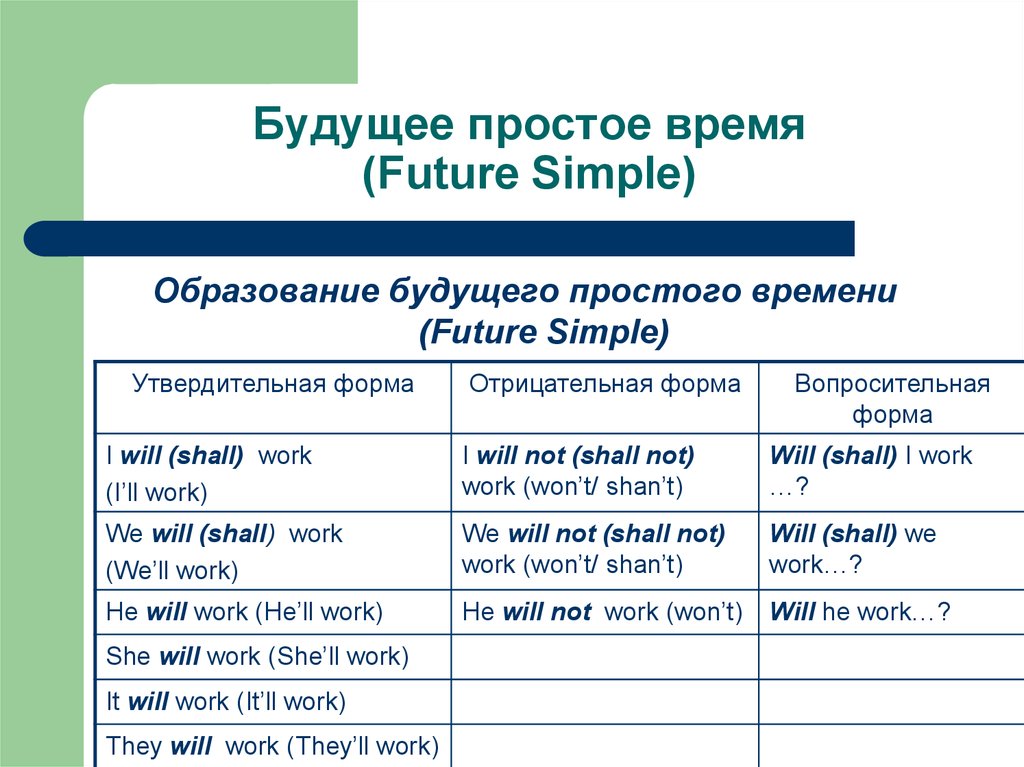
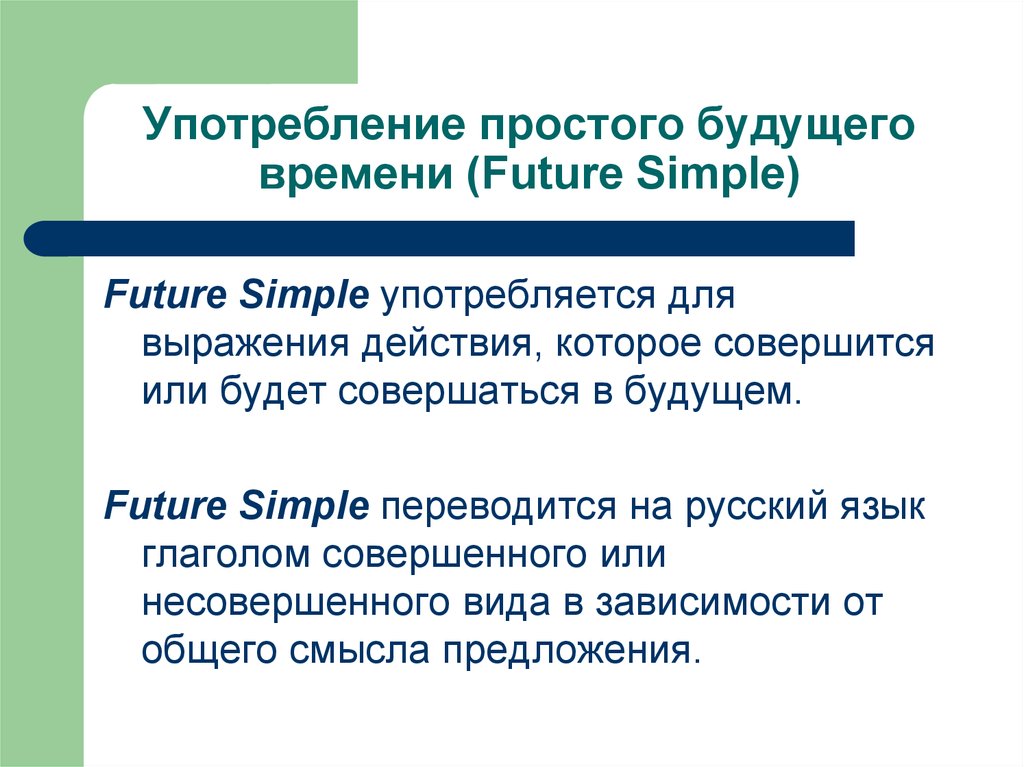
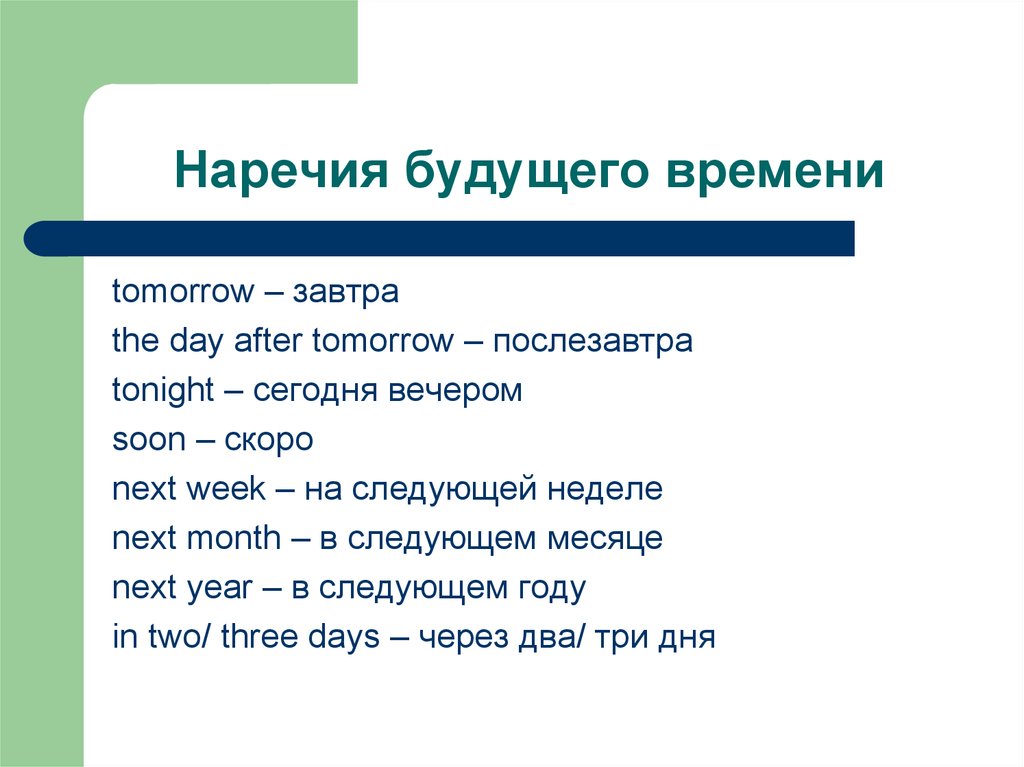


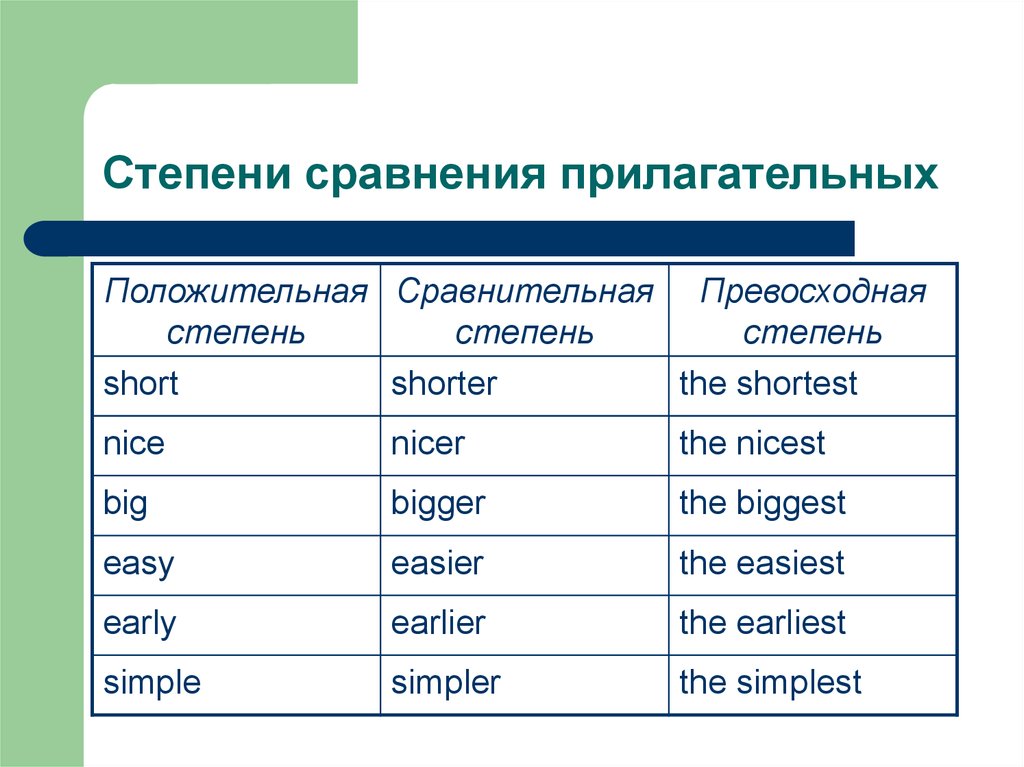
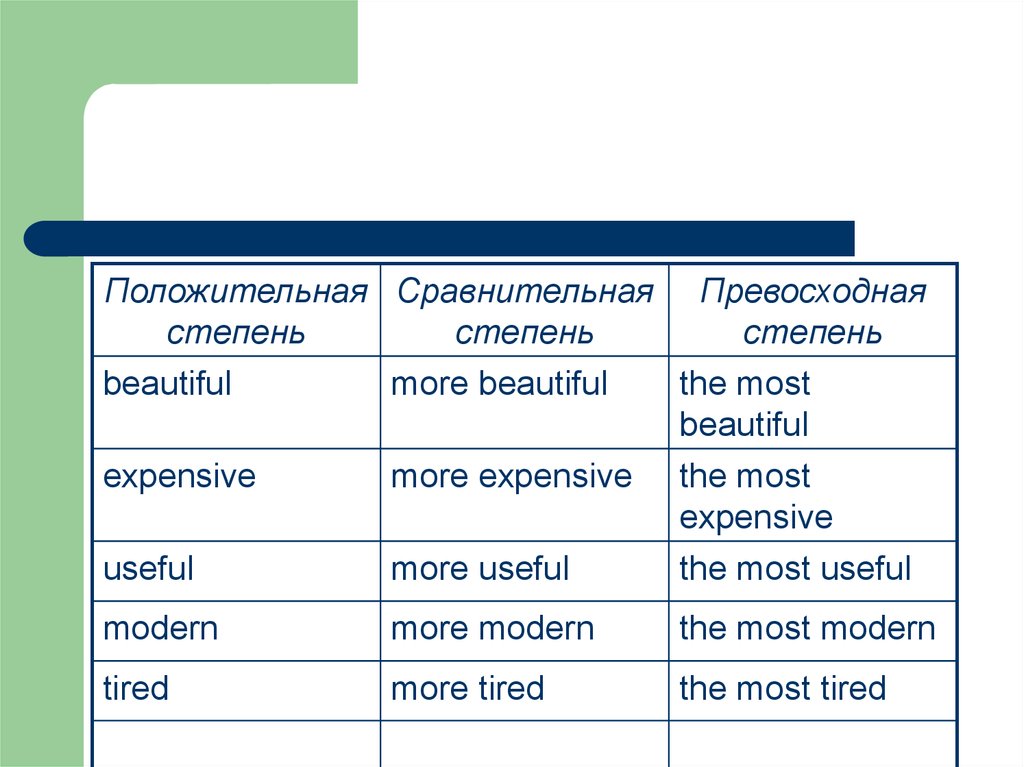
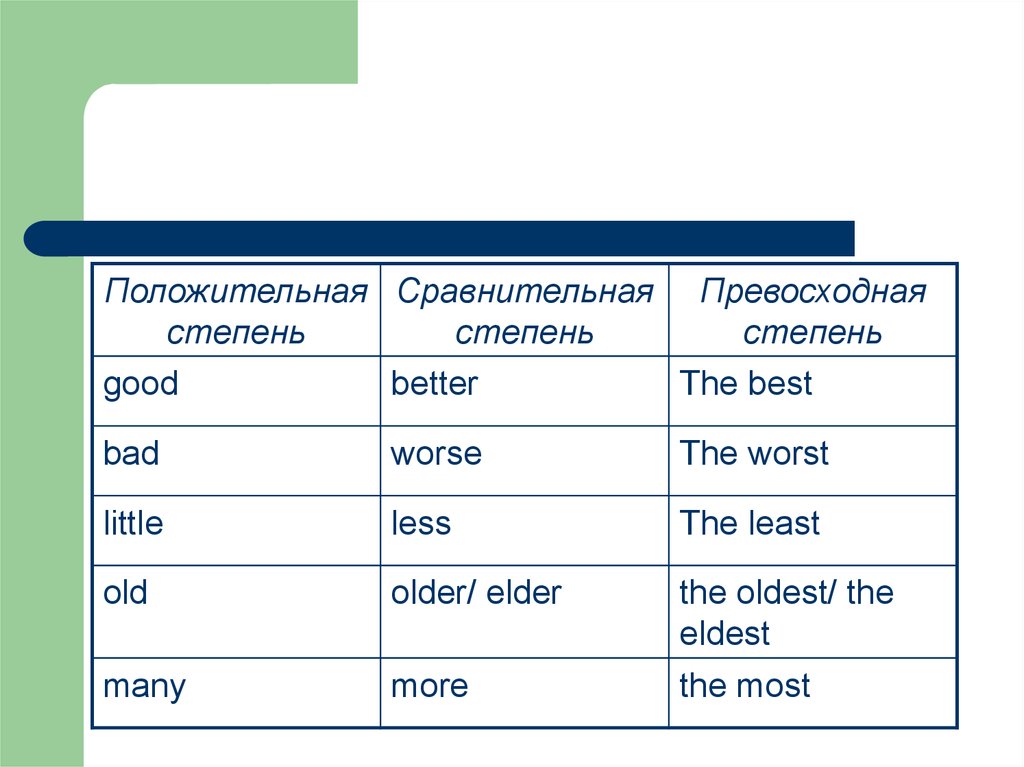
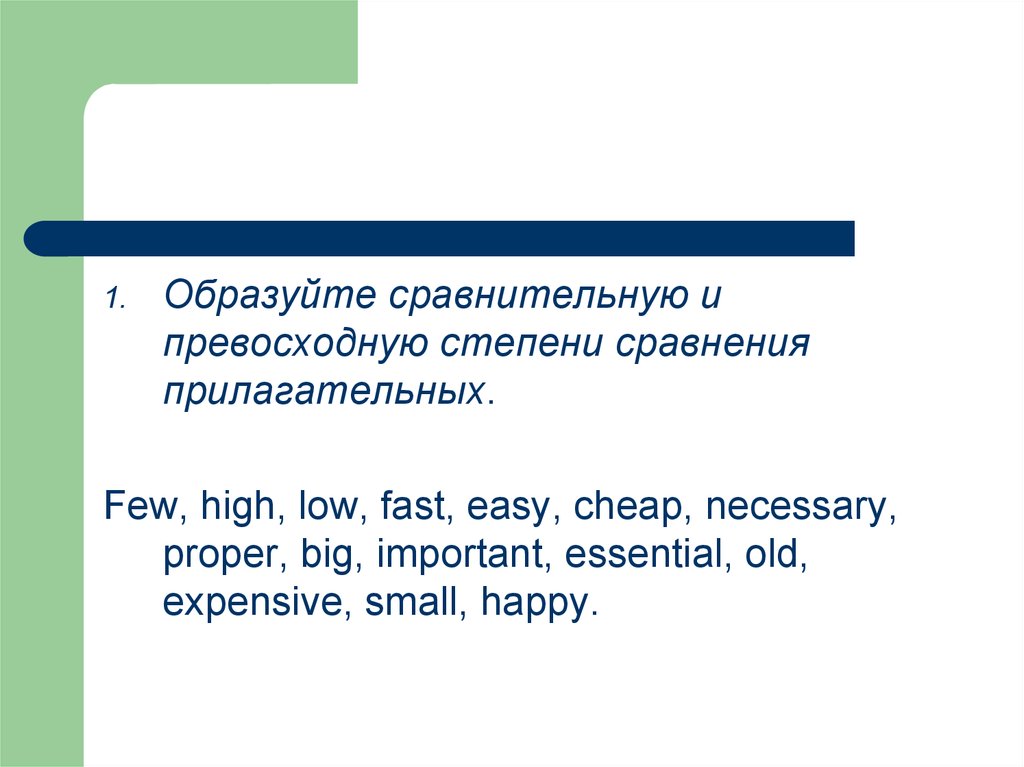


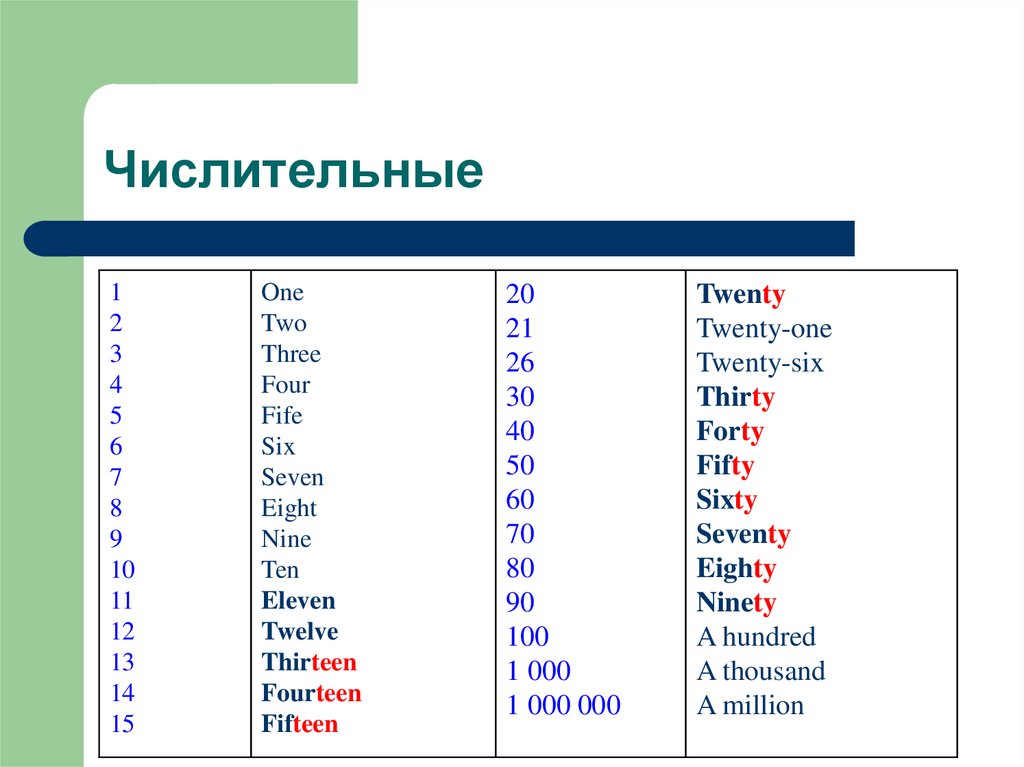

 Английский язык
Английский язык








